Ditapis dengan
E-book Sick Note : A History of the British Welfare State
Darren Anderton played 30 times for the England men’s national football team and made 299 Premier League appearances for Tottenham Hotspur. To fans of a certain age, he is known by another name: ‘Sicknote’. ‘I had a migraine and was throwing up before a Portsmouth game’, recounted Anderton in 2016, some eight years after his final Football League match…
- Edisi
- -
- ISBN/ISSN
- 978019286574
- Deskripsi Fisik
- 245 hlm
- Judul Seri
- -
- No. Panggil
- 940 MIL s
E-book A History of Force Feeding : Hunger Strikes, Prisons and Medical Ethic…
n March 2013, a group of detainees at Guantánamo Bay Detention Camp, Cuba, went on hunger strike. At the height of their protest, 106 individuals were refusing to eat. For detainees incarcerated for over a decade without charge or trial, food refusal offered a potent way to rebel. Having been stripped of their capacity for political communication and placed …
- Edisi
- -
- ISBN/ISSN
- 9783319311135
- Deskripsi Fisik
- 265 hlm
- Judul Seri
- -
- No. Panggil
- 943.9 MIL a
E-book Ginseng and Borderland
In 1745, the Shengjing military governor (jiangjun), Daldangga, wrote to the Qian-long emperor (r. 1736–95) to propose building a guard post at the mouth of the Yalu (K. Amnok) River. The suggested place was Mangniushao, a sandbank located where the confluence of two tributaries of the Yalu River, the Caohe and the Aihe, flowed into the mainstream of the Yalu. These tri…
- Edisi
- -
- ISBN/ISSN
- 9780520295995
- Deskripsi Fisik
- 244 hlm
- Judul Seri
- -
- No. Panggil
- 951.9 KIM g
E-book Policemen of the Tsar : Local Police in an Age of Upheaval
s the minister responsible for the local police, Lanskoi had particular grounds for concern over their poor performance. His, however, was not the only ministry dependent on the police. A contemporary journalist described the local police as, in effect, the eyes, ears, and hands of the state. “Almost everything discussed by ministerial departments,” he noted, “or…
- Edisi
- -
- ISBN/ISSN
- 9789633865767
- Deskripsi Fisik
- 235 hlm
- Judul Seri
- -
- No. Panggil
- 947.1 ABB p
E-book Animal Industries : Nordic Perspectives on the Exploitation of Animals…
In 2019, Juha Marttila, the President of the Central Union of Agricultural Pro-ducers and Forest Owners (MTK) in Finland, expressed his astonishment in apress interview about the increasing public criticism of intensive meat and dairyproduction:“The cow has kept us alive for some ten thousand years, so how comeit has now been made a criminal?”1He was quite right about the long interrela-tio…
- Edisi
- -
- ISBN/ISSN
- 9783110787337
- Deskripsi Fisik
- 281 hlm
- Judul Seri
- -
- No. Panggil
- 940 BJO a
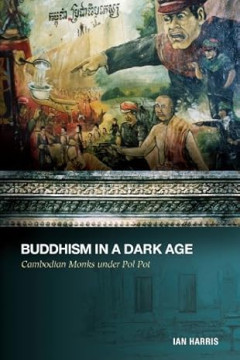
E-book Buddhism in a Dark Age: Cambodian Monks under Pol Pot
This pioneering study of the fate of Buddhism during the communist period in Cambodia puts a human face on a dark period in Cambodia’s history. It is the first sustained analysis of the widely held assumption that the Khmer Rouge under Pol Pot had a centralized plan to liquidate the entire monastic order. Based on a thorough analysis of interview transcripts and a large body of contemporary m…
- Edisi
- -
- ISBN/ISSN
- 9780824835613
- Deskripsi Fisik
- 258 halaman
- Judul Seri
- -
- No. Panggil
- 294.309 HAR b
E-book The Cambridge Illustrated History of the Islamic World
Islamic peoples account for one fifth of the world's population and yet there is widespread misunderstanding in the West of what Islam really is. Francis Robinson and his team set out to address this, revealing the complex and sometimes contrary nature of Muslim culture. As well as taking on the issues uppermost in everyone's minds, such as the role of religious and political fundamentalism, th…
- Edisi
- -
- ISBN/ISSN
- 9780521435102
- Deskripsi Fisik
- 347 halaman, ilus.
- Judul Seri
- -
- No. Panggil
- 297.6 ROB t
E-book The Cambridge Illustrated History of Medicine
- Edisi
- -
- ISBN/ISSN
- 9780521442117
- Deskripsi Fisik
- 400 halaman, ilus.
- Judul Seri
- -
- No. Panggil
- 610 POR t
- Edisi
- -
- ISBN/ISSN
- 9780521442117
- Deskripsi Fisik
- 400 halaman, ilus.
- Judul Seri
- -
- No. Panggil
- 610 POR t
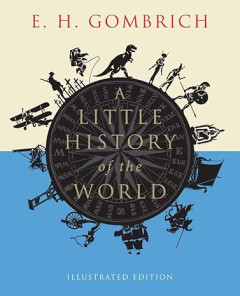
E-book A Little History of the World: Illustrated Edition
E. H. Gombrich’s A Little History of the World, an engaging and lively book written for readers both young and old, vividly brings the full span of human experience on Earth to life, from the stone age to the atomic age. Gombrich’s text paints a colorful picture of wars and conquests; of grand works of art; of the advances and limitations of science; of remarkable people and remarkable even…
- Edisi
- -
- ISBN/ISSN
- 9780300197181
- Deskripsi Fisik
- 455 halaman, ilus.
- Judul Seri
- -
- No. Panggil
- 909 GOM a
E-book The Element Encyclopedia of Secret Societies and Hidden History: The U…
Discover 10,000 years of the shadowy side of our world in this treasure trove of alternative history. The Encyclopedia of Secret Societies features detailed information about.
- Edisi
- -
- ISBN/ISSN
- -
- Deskripsi Fisik
- 550 halaman, ilus.
- Judul Seri
- -
- No. Panggil
- 903 GRE t
E-book Ancient Rome: An Illustrated History
In this colorfully-illustrated reference for young adult readers, the history of ancient Rome is traced from the mythic founding of the city by the twins Romulus and Remus, through its many emperors and wars, to the disintegration of the empire in the third and fourth centuries CE. Boxed information provides further details on aspects of daily life, traditions, and laws; the Roman military; fam…
- Edisi
- -
- ISBN/ISSN
- 9780761499565
- Deskripsi Fisik
- 164 halaman
- Judul Seri
- -
- No. Panggil
- 937 CAV a
E-book An Illustrated History of Britain
This is an illustrated history of Britain from prehistoric times to the present day. The book analyzes the major political and military events in British history, and where appropriate, looks at these within a wider, international context. It also describes everyday life for men and women from different levels of society in different ages: the kind of work they did, family life, etc. Emphasis i…
- Edisi
- -
- ISBN/ISSN
- 9780582749146
- Deskripsi Fisik
- 194 halaman, ilus.
- Judul Seri
- -
- No. Panggil
- 941 MCD a
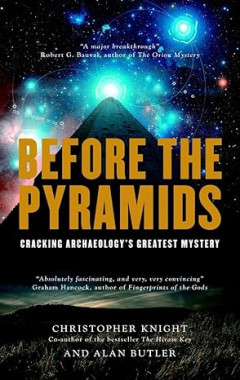
E-book Before the Pyramids: Cracking Archaeology's Greatest Mystery
Were the pyramids of the pharaohs conceived in Britain? The acclaimed coauthors of Civilization One think so, and they take readers on a gripping excursion into ancient religion and astronomy. Knight and Butler not only establish the existence of an advanced civilization with astonishing, almost modern knowledge, but they also explain how the oldest Neolithic monuments--the henges of North York…
- Edisi
- -
- ISBN/ISSN
- 9781907486661
- Deskripsi Fisik
- 252 halaman
- Judul Seri
- -
- No. Panggil
- 932 KNI b
E-book Rethinking the Public Fetus : Historical Perspectives on the Visual Cu…
Today, images of fetuses and pregnant bodies are ubiquitous. We encoun-ter them everywhere—from ultrasound pictures of expected babies in family albums to childbirth scenes in reality television shows or on social media platforms. Images of fetal bodies are also frequently seen in antiabortion campaigns. The capacity of fetal photographs and ultrasound images …
- Edisi
- -
- ISBN/ISSN
- 9781805431404
- Deskripsi Fisik
- 355 hlm
- Judul Seri
- -
- No. Panggil
- 902 BJO r
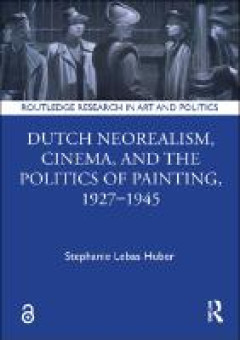
E-book Dutch Neorealism, Cinema, and the Politics of Painting, 1927–1945
This study offers a radically new perspective on Dutch Neorealism, one that emphasizes the role of film as an apparatus, the effects of which, when emulated in painting, can reproduce the affective experience of film-watching. More of a tendency than a tightly defined style or "ism," Neorealism is the Dutch variant of Magic Realism, an uncanny mode of figurative painting identified with Neue Sa…
- Edisi
- -
- ISBN/ISSN
- 9781040135129
- Deskripsi Fisik
- 234 halaman
- Judul Seri
- -
- No. Panggil
- 900.0 HUB d
E-book Invoking Flora Nwapa : Nigerian women writers, femininity and spiritua…
By invoking Flora Nwapa, this monograph draws attention to Nigerian women writers in world literature, with an emphasis on femininity and spirituality. Flora Nwapa’s Efuru was the first internationally published novel in English by a female African writer (Nwapa 1966). With the establishment of Tana Press in 1977, Flora Nwapa also became the first fe…
- Edisi
- -
- ISBN/ISSN
- 9789176351208
- Deskripsi Fisik
- 258 hlm
- Judul Seri
- -
- No. Panggil
- 960 UIM i
E-book All Things Arabia : Arabian Identity and Material Culture
n a suggestive passage, Wilfred Thesiger, or, as his Arab friends affectionately called him, Mubarak bin London, described his encounter with the people of the Empty Quarter in the following terms:“The northern Arabs had no traditions of civiliza-tion behind them. To arrange three stones as a fireplace on which to set a pot was the only archi-tecture that many …
- Edisi
- -
- ISBN/ISSN
- 9789004435926
- Deskripsi Fisik
- 286 hlm
- Judul Seri
- -
- No. Panggil
- 939.4 BAI a
E-book Sharpening the Haze : Visual Essays on Imperial History and Memory
In a blog post on a recent trip to a Peruvia n monastery, Sa ra Salem recounts the moment she recognized Andalusia n tiles da ting from the era of Spa nish coloniza tion. Reflecting on this encounter with the lasting ma terial legacy of imperial expa nsion, she concludes tha t “[w]e could tell a nice story ... a bout how a rt travels a nd spreads a nd crosses bo…
- Edisi
- -
- ISBN/ISSN
- 9781911529651
- Deskripsi Fisik
- -
- Judul Seri
- -
- No. Panggil
- 902 BAR s
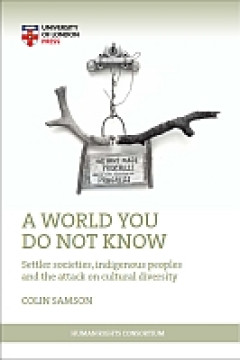
E-book A World You Do Not Know: Settler Societies, Indigenous Peoples and the…
A World You Do Not Know explores the wilful ignorance demonstrated by North America’s settlers in establishing their societies on lands already occupied by indigenous nations. Using the Innu of Labrador-Quebec as one powerful contemporary example, Colin Samson shows how the processes of displacement and assimilation today resemble those of the 19th century as the state and corporations scramb…
- Edisi
- -
- ISBN/ISSN
- 9781912250394
- Deskripsi Fisik
- 278 halaman
- Judul Seri
- -
- No. Panggil
- 325.3 SAM a
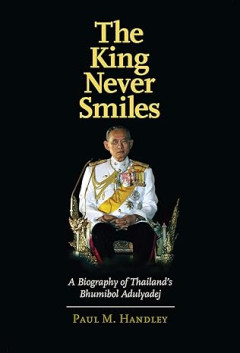
E-book The King Never Smiles: A Biography of Thailand's Bhumibol Adulyadej
Thailand’s Bhumibol Adulyadej, the only king ever born in the United States, came to the throne of his country in 1946 and at the time of his death, in October 2016, was the world’s longest serving monarch. The King Never Smiles, the first independent biography of Thailand's monarch, tells the unexpected story of Bhumibol's life and sixty-year rule—how a Western-raised boy came to be seen…
- Edisi
- -
- ISBN/ISSN
- 9780300106824
- Deskripsi Fisik
- 514 halaman
- Judul Seri
- -
- No. Panggil
- 959.3 HAN t
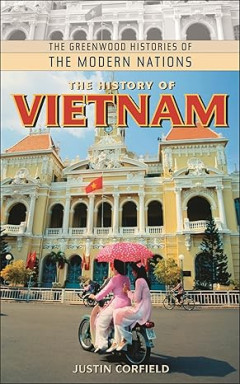
E-book The History of Vietnam (The Greenwood Histories of the Modern Nations)
Everyone knows Vietnam for its turbulent environment during the second half of the 20th century, but few know that archaeologists believe that civilization there existed as far back as the Bronze Age. Vietnam's history runs rampant with clashing dynasties, civil wars and power struggles between the North and South, and conflicts with neighboring and other countries. First ruled under China's cl…
- Edisi
- -
- ISBN/ISSN
- 9780313341939
- Deskripsi Fisik
- 183 halaman
- Judul Seri
- -
- No. Panggil
- 959.7 COR t
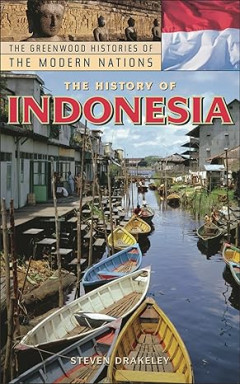
E-book The History of Indonesia (The Greenwood Histories of the Modern Nations)
Culturally and politically, Indonesia is one of the more complex countries in the world, with 336 ethnic groups speaking 583 languages and dialects. It is only recently that these people have been contained within one political framework. Throughout most of history, Indonesia's inhabitants were divided politically in many different ways as a bewildering array of kingdoms and empires rose and fe…
- Edisi
- -
- ISBN/ISSN
- 9780313331146
- Deskripsi Fisik
- 228 halaman
- Judul Seri
- -
- No. Panggil
- 959.8 DRA t

E-book The History of Pakistan (The Greenwood Histories of the Modern Nations)
The History of Pakistan explores the rich and intricate past of a highly diverse nation still in the process of determining its own identity. Rooted in the ancient Indus Valley Civilization, shaped by the cultures of both the Middle and Far East, and now predominantly devoted to Islam, Pakistan has emerged as a unique Indo-Muslim community, viewed with caution and curiosity by the rest of the w…
- Edisi
- -
- ISBN/ISSN
- 9780313341373
- Deskripsi Fisik
- 262 halaman
- Judul Seri
- -
- No. Panggil
- 954.91 MAL t
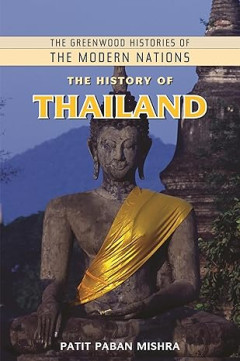
E-book The History of Thailand (The Greenwood Histories of the Modern Nations)
The book provides a clear portrayal of Thailand's culture and society, and explains its significance in the history of human civilization, its strategic geographic location, and its attraction as a tourist destination. Thailand is a fascinating country with a very rich culture and history. Today, it is home to over 60 million people, and is a newly industrialized nation with an emerging worl…
- Edisi
- -
- ISBN/ISSN
- 9780313340918
- Deskripsi Fisik
- 209 halaman
- Judul Seri
- -
- No. Panggil
- 959.3 MIS t

E-book Conversations with Lee Kuan Yew: Citizen Singapore: How to Build a Nation
Imagine the delight and challenge of entering into a one-on-one political and personal conversation with the founding father of modern Singapore. This is exactly the timely treat that awaits you in Conversations with Lee Kuan Yew. The first in the Giants of Asia series, this succinct, penetrating, richly detailed and candid book on Lee Kuan Yew represents the Asian legend s first extended conve…
- Edisi
- -
- ISBN/ISSN
- 9789814435673
- Deskripsi Fisik
- 171 halaman
- Judul Seri
- -
- No. Panggil
- 959.57 PLA c
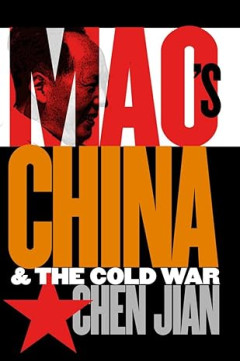
E-book Mao's China and the Cold War
This comprehensive study of China's Cold War experience reveals the crucial role Beijing played in shaping the orientation of the global Cold War and the confrontation between the United States and the Soviet Union. The success of China's Communist revolution in 1949 set the stage, Chen says. The Korean War, the Taiwan Strait crises, and the Vietnam War--all of which involved China as a cent…
- Edisi
- -
- ISBN/ISSN
- 9780807849324
- Deskripsi Fisik
- 415 halaman
- Judul Seri
- -
- No. Panggil
- 951 CHE m
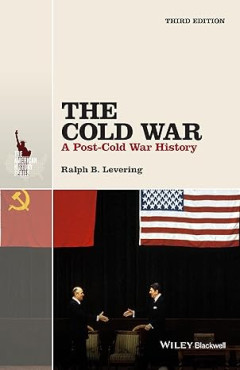
E-book The Cold War: A Post-Cold War History, Third Edition
Thoroughly updated in light of new scholarship, including revised sections on President Nixon’s policies in Vietnam and President Reagan’s approach to U.S.-Soviet relations Features six all new "counterparts" sections that juxtapose important historical figures to illustrate the contrasting viewpoints that characterized the Cold War Argues that the success of Western capitalism during th…
- Edisi
- -
- ISBN/ISSN
- 9781118848401
- Deskripsi Fisik
- 298 halaman
- Judul Seri
- -
- No. Panggil
- 940.54 LEV t
E-book Splendors of Quanzhou, Past and Present
Zaytun’s True Wealth Marco Polo was impressed by Zaytun’s gems, pearls, porcelain, and silk, but he overlooked the true wealth of this mythic port—the place and the people! Zaytun was blessed with an unparalleled natural wealth and beauty that the enlightened inhabitants maintained as meticulously as their miniature landscapes, which have been…
- Edisi
- -
- ISBN/ISSN
- 9789811980367
- Deskripsi Fisik
- 139 hlm
- Judul Seri
- -
- No. Panggil
- 950.4 BRO s
E-book Private Enterprise and the China Trade : Merchants and Markets in Euro…
When Vasco da Gama sailed around the Cape of Good Hope to reach India in 1497–1498, he had not only discovered a new sea route between Europe and Asia but also opened up a new world of commerce that would shape European consumption, manufacturing, and ultimately industrial production over the following centuries. While goods from the East had reached Europe much ear-lier …
- Edisi
- -
- ISBN/ISSN
- 9789004504745
- Deskripsi Fisik
- 276 hlm
- Judul Seri
- -
- No. Panggil
- 909.7 VON p
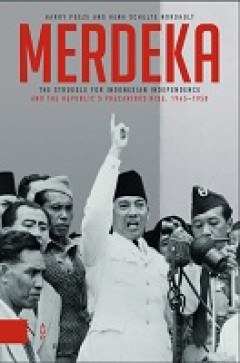
E-book Merdeka: The Struggle for Indonesian Independence and the Republic’s…
Under the slogan ‘Merdeka!’ the Republic of Indonesia rushed into a battle for independence – a struggle of which no one could predict the outcome. Harry Poeze and Henk Schulte Nordholt provide a new narrative about the revolution, one that focuses not only on the fight against the Dutch but also on the precarious rise of the Republic. After the horrors of the Japanese occupation, the Rep…
- Edisi
- -
- ISBN/ISSN
- 9789048560837
- Deskripsi Fisik
- 456 halaman
- Judul Seri
- -
- No. Panggil
- 959.8035 POE m
E-book The Creighton Century, 1907-2007
The first Creighton Lecture took place on 4 October 1907, almost seven years after the death of the scholar and bishop whom it honoured. Apart from being delivered by a lifelong friend, its published version stands in no discernible relation to Mandell Creighton himself, except for treating of his narrower patria, the Anglo-Scottish border. In fact the whole subsequent lect…
- Edisi
- -
- ISBN/ISSN
- 9781912702749
- Deskripsi Fisik
- 338 hlm
- Judul Seri
- -
- No. Panggil
- 907 BAT t
E-book Green Development or Greenwashing? : Environmental Histories of Finland
Finland has been often labelled a ‘green superpower’. In 2016, according to the EPI (Environmental Performance Index) prepared by Yale and Columbia Universities, Finland was the world’s cleanest and greenest country.1 Gener-ally speaking, Nordic countries have tended to be idealised as ‘pristine and green’ compared to the rest of the rapidly contaminating world where the r…
- Edisi
- -
- ISBN/ISSN
- 9781912186778
- Deskripsi Fisik
- 260 hlm
- Judul Seri
- -
- No. Panggil
- 948.1 PAL g
E-book Political Landscapes : Forests, Conservation, and Community in Mexico
In 1937 an offi cial from the Mexican forest service visited the rugged Sierra Tarahumara mountains in southern Chihuahua, which even today remain one of the nation’s most isolated places. Th e landscape that greeted An-tonio H. Sosa was unlike anything he had seen in central Mexico. He ad-mired the “immensity, beauty, and potential” of the untouched Ponderosa and Montezuma pines tha…
- Edisi
- -
- ISBN/ISSN
- 9780822375876
- Deskripsi Fisik
- 361 hlm
- Judul Seri
- -
- No. Panggil
- 970 BOY p
E-book The Path of Pleasantness : Ippolito II d'Este Between Ferrara, France …
Ippolito II d’Este was born in 1509 into a Ferrara ruled by his father, Duke Al-fonso I d’Este. His mother was Lucrezia Borgia, the daughter of Pope Alexander VI, who had orchestrated the marriage in the hope of tying his lineage to an established Italian family. The Este had been ruling over Ferrara, Modena and Reggio since the thirteen century and had increasingly extended their territori…
- Edisi
- -
- ISBN/ISSN
- 9788855182669
- Deskripsi Fisik
- 209 hlm
- Judul Seri
- -
- No. Panggil
- 945 VID t
E-book Beyond the Pale : Dutch Extreme Violence in the Indonesian War of Inde…
Between 1945 and 1949, Indonesia defended its recently declared indepen-dence, and the Netherlands waged its last major colonial war.1 Much is now known about this war, but a great deal has also remained unclear or con-tested. At the end of 2016, the second Rutte cabinet decided to finance a broad-based study – conducted by the kit lv, the nimh and niod2 – on the …
- Edisi
- -
- ISBN/ISSN
- 789048557172
- Deskripsi Fisik
- 594 hlm
- Judul Seri
- -
- No. Panggil
- 959.802 AMS b
E-book Rural Granaries in Northern Gaul (Sixth Century BCE – Fourth Century…
Compared with other pre-industrial societies, a rather high percentage of the Roman population in the Gallic and Germanic provinces was not involved in agrarian production during the High Empire. Rural produce was needed to feed soldiers and the inhabitants of vici, small towns and cities. To maintain this system the Gallo-Roman villae – the rural settlements whose…
- Edisi
- Vol. 8
- ISBN/ISSN
- 9789004389045
- Deskripsi Fisik
- 195 hlm
- Judul Seri
- -
- No. Panggil
- 930 MAR r

E-book Authoritarian Modernization in Indonesia’s Early Independence Period…
In Authoritarian Modernization in Indonesia’s Early Independence Period, Farabi Fakih offers a historical analysis of the foundational years leading to Indonesia’s New Order state (1966–1998) during the early independence period. The study looks into the structural and ideological state formation during the so-called Liberal Democracy (1950–1957) and Sukarno’s Guided Democracy (1957�…
- Edisi
- -
- ISBN/ISSN
- 9789004437722
- Deskripsi Fisik
- 314 halaman
- Judul Seri
- -
- No. Panggil
- 959.8 FAK a

E-book Poetry of Loss and the Early Medieval Chinese Court of the Warlord Cao…
Upon the fall of the Han empire, the warlord Cao Cao (155–220) established a new political domain. The Cao court became known for its accomplished writers, including the warlord himself and two of his sons, Cao Pi (187–226) and Cao Zhi (192–232). Afflicted by sibling rivalry and an epidemic, these poets distinguished themselves by writing about frustration, sorrow, and death. Yet, as obse…
- Edisi
- -
- ISBN/ISSN
- 9781802701777
- Deskripsi Fisik
- 144 halaman
- Judul Seri
- -
- No. Panggil
- 931 SHI p
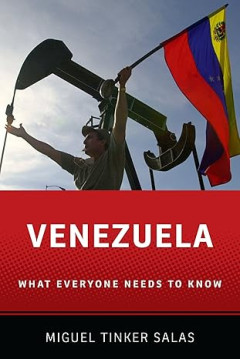
E-book Venezuela: What Everyone Needs to Know®
Among the top ten oil exporters in the world and a founding member of OPEC, Venezuela currently supplies 11 percent of U.S. crude oil imports. But when the country elected the fiery populist politician Hugo Chavez in 1998, tensions rose with this key trading partner and relations have been strained ever since. In this concise, accessible addition to Oxford's What Everyone Needs to Know® ser…
- Edisi
- -
- ISBN/ISSN
- 9780199783298
- Deskripsi Fisik
- 2015
- Judul Seri
- -
- No. Panggil
- 987 SAL v
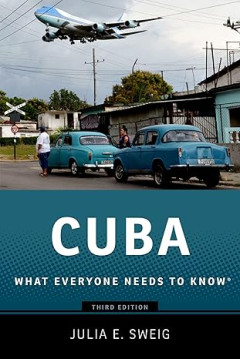
E-book Cuba: What Everyone Needs to Know®
Ever since Fidel Castro assumed power in Cuba in 1959, Americans have obsessed about the nation ninety miles south of the Florida Keys. America's fixation on the tropical socialist republic has only grown over the years, fueled in part by successive waves of Cuban immigration and Castro's larger-than-life persona. Cubans are now a major ethnic group in Florida, and the exile community is so pow…
- Edisi
- -
- ISBN/ISSN
- 9780190620370
- Deskripsi Fisik
- 385 halaman
- Judul Seri
- -
- No. Panggil
- 972.91 SWE c
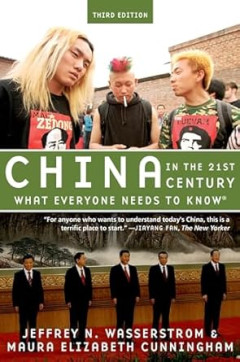
E-book China in the 21st Century: What Everyone Needs to Know®
In this fully revised and updated third edition of China in the 21st Century: What Everyone Needs to Know®, Jeffrey N. Wasserstrom and Maura Elizabeth Cunningham provide cogent answers to urgent questions regarding the world's newest superpower and offer a framework for understanding China's meteoric rise from developing country to superpower. Framing their answers through the historical legac…
- Edisi
- -
- ISBN/ISSN
- 9780190659080
- Deskripsi Fisik
- 187 halaman
- Judul Seri
- -
- No. Panggil
- 951 WAS c
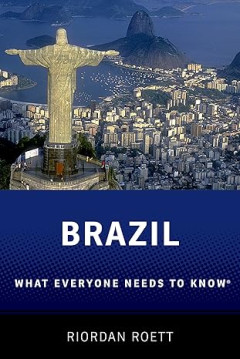
E-book Brazil: What Everyone Needs to Know®
Brazil is one of the most important but puzzling countries in the world. A nation of 200 million people, it has vast natural resource reserves, rich cultural traditions, a middle class undergoing explosive growth, and social welfare policies that are models for much of the world ('la bolsa familia,' which provides a guaranteed income to poor families). And, after decades of authoritarian rule, …
- Edisi
- -
- ISBN/ISSN
- 9780190224523
- Deskripsi Fisik
- 257 halaman
- Judul Seri
- -
- No. Panggil
- 981 ROE b
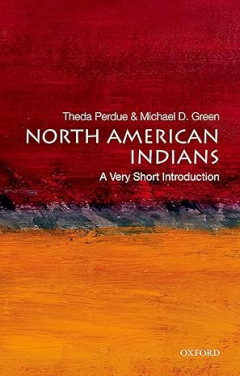
E-book North American Indians: A Very Short Introduction
When Europeans first arrived in North America, between five and eight million indigenous people were already living there. But how did they come to be here? What were their agricultural, spiritual, and hunting practices? How did their societies evolve and what challenges do they face today? Eminent historians Theda Perdue and Michael Green begin by describing how nomadic bands of hunter-gather…
- Edisi
- -
- ISBN/ISSN
- 9780195307542
- Deskripsi Fisik
- 161 halaman
- Judul Seri
- -
- No. Panggil
- 970 PER n
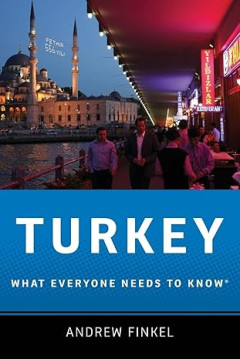
E-book Turkey: What Everyone Needs to Know®
Turkey occupies a strategic position in today's world: the only predominantly Muslim nation to be a member of NATO and an ally of Israel, it straddles both Europe and Asia. Turkey is the link between Islam and Western democracy, between Europe and the Middle East. In this concise introduction, Andrew Finkel, who has spent twenty years in Turkey writing about the country for publications such as…
- Edisi
- -
- ISBN/ISSN
- 9780199733040
- Deskripsi Fisik
- 225 halaman
- Judul Seri
- -
- No. Panggil
- 956.1 FIN t
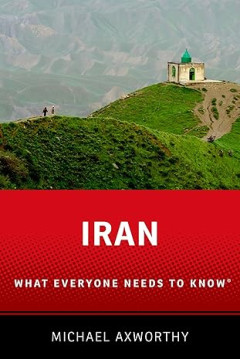
E-book Iran: What Everyone Needs to Know®
Since the beginning of recorded history, Iran/Persia has been one of the most important world civilizations. Iran remains a distinct civilization today despite its status as a major Islamic state with broad regional influence and its deep integration into the global economy through its vast energy reserves. Yet the close attention paid to Iran in recent decades stems from the impact of the 1979…
- Edisi
- -
- ISBN/ISSN
- 9780190232955
- Deskripsi Fisik
- 225 halaman
- Judul Seri
- -
- No. Panggil
- 935 AXW i
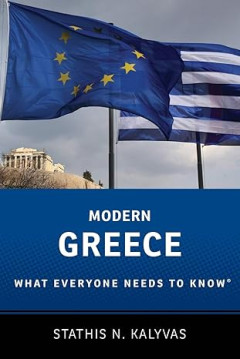
E-book Modern Greece: What Everyone Needs to Know®
When Greece's economic troubles began to threaten the stability of the European Union in 2010, the nation found itself in the center of a whirlwind of international finger-pointing. In the years prior, Greece appeared to be politically secure and economically healthy. Upon its emergence in the center of the European economic maelstrom, however, observers and critics cited a century of economic …
- Edisi
- -
- ISBN/ISSN
- 9780199948796
- Deskripsi Fisik
- 265 halaman
- Judul Seri
- -
- No. Panggil
- 949.5 KAL m
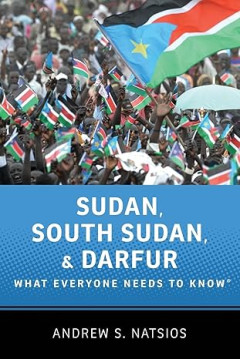
E-book Sudan, South Sudan, and Darfur: What Everyone Needs to Know®
For thirty years Sudan has been a country in crisis, wracked by near-constant warfare between the north and the south. But on July 9, 2011, South Sudan became an independent nation. As Sudan once again finds itself the focus of international attention, former special envoy to Sudan and director of USAID Andrew Natsios provides a timely introduction to the country at this pivotal moment in its h…
- Edisi
- -
- ISBN/ISSN
- 9780199764198
- Deskripsi Fisik
- 234 halaman
- Judul Seri
- -
- No. Panggil
- 962.4 NAT s
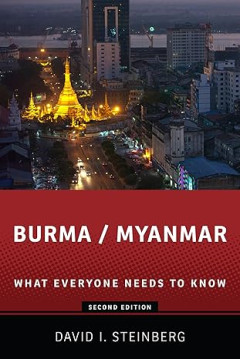
E-book Burma/Myanmar: What Everyone Needs to Know®
No country in Asia in recent years has undergone so massive a political shift in so short a time as Myanmar. Until recently, the former British colony had one of the most secretive, corrupt, and repressive regimes on the planet, a country where Nobel Peace Prize laureate Aung San Suu Kyi was held in continual house arrest and human rights were denied to nearly all. Yet events in Myanmar since t…
- Edisi
- -
- ISBN/ISSN
- 9780199981687
- Deskripsi Fisik
- 289 halaman
- Judul Seri
- -
- No. Panggil
- 959.1 STE b
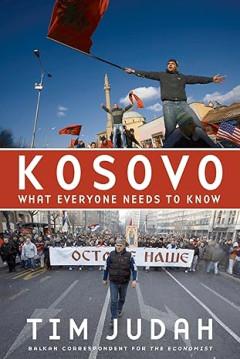
E-book Kosovo: What Everyone Needs to Know®
On February 17, 2008, Kosovo declared its independence, becoming the seventh state to emerge from the break-up of the former Yugoslavia. A tiny country of just two million people, 90% of whom are ethnic Albanians, Kosovo is central-geographically, historically, and politically-to the future of the Western Balkans and, in turn, its potential future within the European Union. But the fate of both…
- Edisi
- -
- ISBN/ISSN
- 9780195373455
- Deskripsi Fisik
- -
- Judul Seri
- -
- No. Panggil
- 947 JUD k
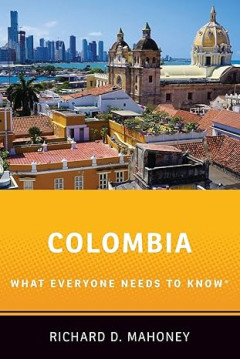
E-book Colombia: What Everyone Needs to Know®
Colombia's recent past has been characterized by what its Nobel laureate Gabriel García Marquez once called "a biblical holocaust" of human savagery. Along with the scourge of drug-related massacres facing the country, politically-motivated assassinations (averaging 30 per day in the 1990s), widespread disappearances, rapes, and kidnappings have run rampant through the country for decades. For…
- Edisi
- -
- ISBN/ISSN
- 9780190262747
- Deskripsi Fisik
- 304 halaman
- Judul Seri
- -
- No. Panggil
- 986.1 MAH c
 Karya Umum
Karya Umum  Filsafat
Filsafat  Agama
Agama  Ilmu-ilmu Sosial
Ilmu-ilmu Sosial  Bahasa
Bahasa  Ilmu-ilmu Murni
Ilmu-ilmu Murni  Ilmu-ilmu Terapan
Ilmu-ilmu Terapan  Kesenian, Hiburan, dan Olahraga
Kesenian, Hiburan, dan Olahraga  Kesusastraan
Kesusastraan  Geografi dan Sejarah
Geografi dan Sejarah